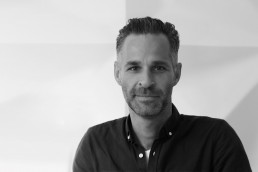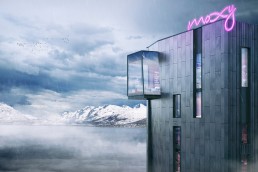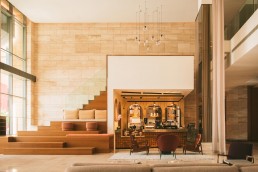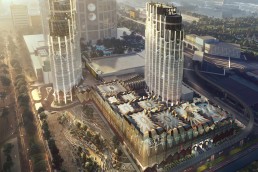Ewald Damen, Creative Director of Virgile + Partners, on why health is key to good design
Ewald Damen, Creative Director and Managing Partner at Virgile + Partners, discusses some of the trends to look out for in the years to come, including the rising importance of health and the shifting office landscape.
The pandemic has raised many challenges for all industries, but hospitality has been particularly hard hit and, even now, is only showing a slow recovery.
Although not everyone has made drastic changes to the way they live, a general shift in people’s attitudes has emerged – with the majority changing the way they think about aspects of their lives and altering some features of their lifestyle. The world around us will need to respond and this includes the travel industry and hotels, which must adapt to new expectations in a competitive market.
So, while Covid-19 did not stop the world forever, it did give us some time to reflect on elements of life – and what has, or should, become more important to us. As people reassessed their lives pre-pandemic, spending more quality time was frequently mentioned as a change they wanted to make. However, this might not just refer to the concept of time, but rather to having more personal space in general and feeling better as a consequence.
As the health trend continues to accelerate becoming a greater part of a new way of living, people’s expectations of body and mind wellbeing have set a clear direction of travel to increased awareness of broader aspects of wellbeing – to encompass a spectrum of sustainability and ethics.
The pandemic offered a ‘reset of life’ and examples where pollution levels significantly reduced have helped to increase environmental awareness and the impact of pollution on the planet and humanity. A healthy lifestyle is not possible if our surroundings are not in a good state and has a direct effect on how people choose (sustainable) products or how they become more selective in their general choices.
The hospitality industry has often been at the forefront of new and more radical ways of thinking and now it should take a more genuine stance towards addressing sustainability and health as an integrated element of design.
For example, biophilic design has been – and is becoming increasingly – discussed across sectors such as retail and office environments, and new ways of biophilic thinking should be considered by leading hotels as a new way forward, or at least as an important focal point.
Environmental awareness and greater consciousness of the natural world will impact hotel design – from the sustainability of the materials used in construction, where items are sourced and how they are transported to different locations.
Creating healthier environments that take more notice of our planet and using design to give people a better connection to nature will ultimately have an impact on the wellbeing of the customer. In the luxury hotel sector, we will see a shift from the established 5-star formula of sumptuous rich, rare and exotic design – often using harmful materials – to a reworked set of criteria with different values. This may involve more spacious rooms for yoga, welcoming workspaces, fresh air and a renewed take on the minibar.
It is difficult to specify one set of design rules as designs will always vary from property to property but, in the main, it will be the inner city and urban hotels that have the more challenging task of meeting new expectations, by virtue of their locations. Rural resorts have a more obvious and natural connection to their surroundings that befit a much more environmental policy.
However, it’s the urban hotel where expectations will be highest – as these largely service the new generation of more discerning and affluent travellers. These are the guests who are looking for their experience to include wellbeing, food and other areas such as service and privacy.
The hotel industry cannot afford to ignore these trends if it wants to build momentum behind a recovery – and that means ditching short-term solutions for more detailed consideration of design and experience. It should no longer be an added value item – too often watered down or cut completely during the design process, due to lack of funding or prioritising other elements.
A change in thinking for hotel brands and developers requires taking a longer-term approach to design and adopting a model that can withstand the test of time – able to adapt to an evolving way of conscious thinking.
As we’ve seen with the changed perspective of fast fashion and how that’s impacted the fashion industry – criticism has come thick and fast since the pandemic for its wasteful and non-environmental approach. This trend will surely follow through into the hotel industry, with a new generation of guests similarly judging the environmental credentials of their hotel choice.
An additional pandemic-related shift in our mentality is towards the traditional 9-5 work/office routine – now usurped for a more flexible approach to work hours and location. Remote working has become acceptable for many employees with “office hours” distributed to a more convenient work schedule. In addition to this, work travel has really suffered since Covid, and with video calls now familiar territory, it is unlikely that the old format will return.
Altogether, this will affect the amount – and reasons why and how long – we will travel. More complicated and expensive travel will most likely combine business and pleasure for longer periods, changing the expectations of a hotel and its services, to provide guests with a much better experience that might involve more time using the facilities including the room.
A more radical shift to genuine sustainability and focus on wellbeing is inevitable if the industry is to meet the evolving expectations of guests and continue to attract a generation and its changing attitudes. Half-considered signs extolling saving the planet by not washing your towels every day are simply not sufficient – systems and services require a proper re-think with space, comfort, food, carbon footprints, privacy and [health] services all needing to be front of mind.
Related Posts
24 November 2021
Moxy Hotels to arrive in Tromso in 2023
24 November 2021
The House Hotel Jeddah City Yard opens its doors
24 November 2021




